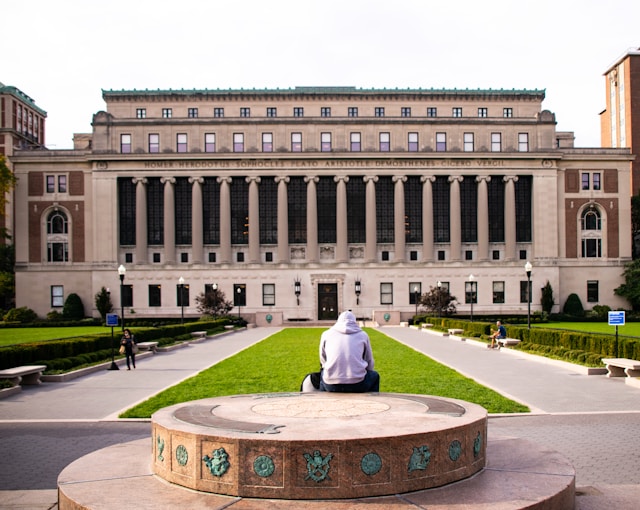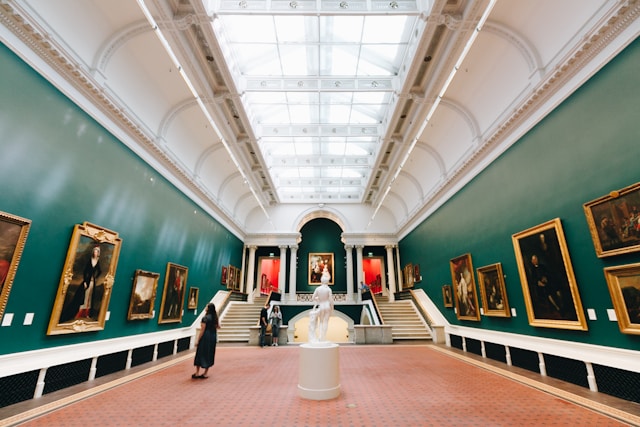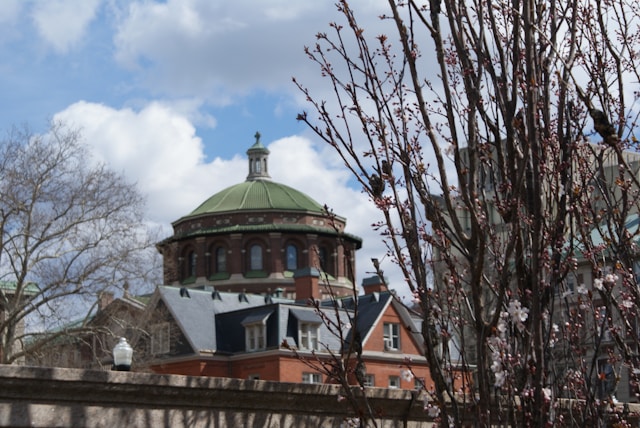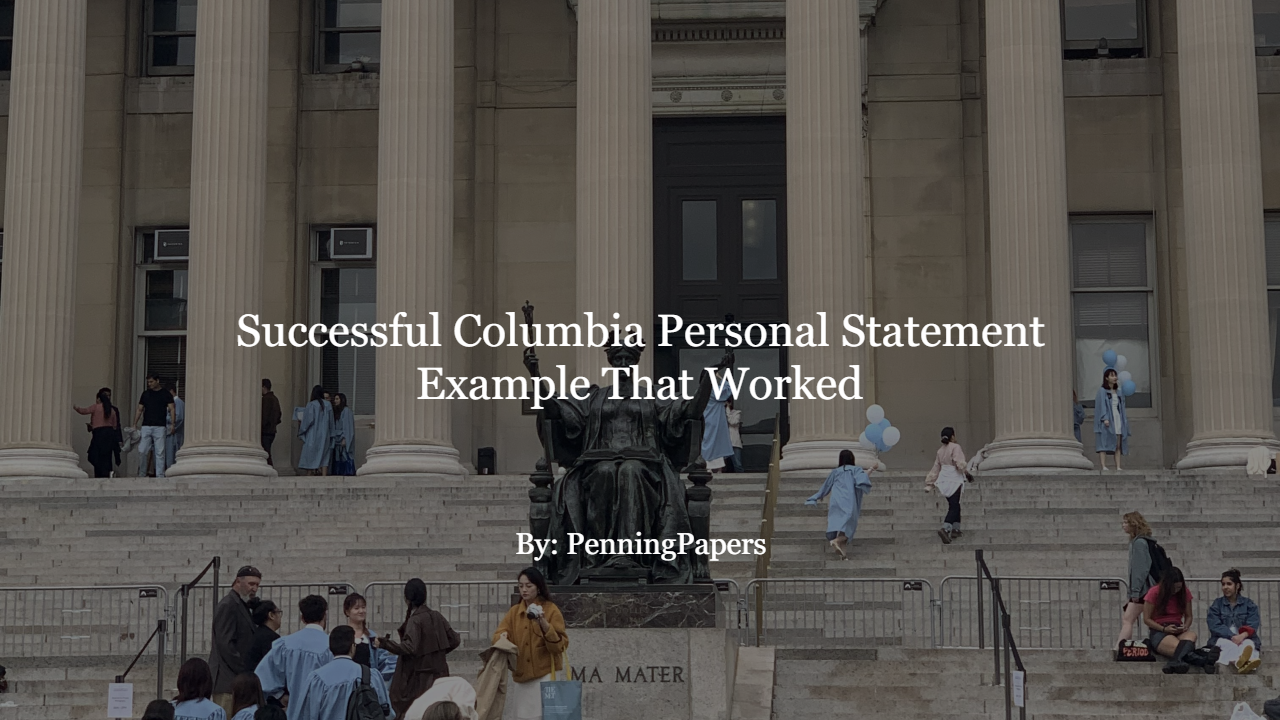Note: this article covers our Columbia Personal Statement example that worked. If you’re looking for the Columbia Statement of Purpose example, you can check out our sister article here.
Table of Contents
- Columbia Masters Personal Statement Prompt
- Our Applicant’s Profile
- Successful Columbia Personal Statement Example That Worked
- What Made this PS Strong?
- Frequently Asked Questions
Professional College Application Help.
Contact us. We'll get to you within 24 hours.
Columbia Masters Personal Statement Prompt

Tip: Columbia’s Masters Personal Statement is different from its Statement of Purpose. The former is more —as the name suggests— personal. The latter meanwhile is more concerned with interests and goals related to field of study and career pertaining to said study.
“Please find the personal statement prompt below:
A wide diversity of experiences and perspectives in the graduate student body enhances Columbia’s academic life: Graduate students work closely with the faculty, constitute the classroom context for their peers, and make substantive contributions to the University’s pedagogical and research enterprise.
We ask that you provide a statement (maximum of 1,000 words) that explains how your personal experiences and history will allow you to contribute to the wealth of perspectives in the entering class of the Graduate School of Arts and Sciences and in the Columbia community at large.”
Columbia Masters Personal Statement Prompt –Sourced From Official Website
Our Applicant’s Profile

The applicant to whom this essay belongs to is someone we’ve advised for their Art History masters. Below we’ve provided some information regarding their application stats and background.
- GPA: 3.7
- Program: Art History
- Research: * N/A
- Work Experience: * Extensive
- Extracurriculars: * 2
*indicates the applicant chose to withhold details for privacy reasons.
Note that this is just one accepted student. There are plenty (okay, probably not plenty; but, you get what we mean) of accepted students who had different stats and backgrounds.
Thus, this profile is NOT conducive of all students accepted into Columbia’s Masters program. Having a similar profile doesn’t guarantee acceptance into Columbia’s Masters program.
There’s a randomness factor that ensures a diversity of student body. That’s why applying to a wide range of schools is crucial. For more info on casting wide nets, check out our section 1D of our article on how many schools to apply to.
And, if you’re unsure what programs your stats qualify you for, schedule a free consultation with us! We’ll respond within 24 hours to help you craft a solid list of programs suited to your stats, background, interests, and needs.
Successful Columbia Personal Statement Example That Worked

“Looking back, I was practicing art history without even knowing. When we moved beyond the painting units in school, I found new mentors peppered across museum walls. Brush strokes and vivid colors entranced me; delicate lace and tree leaves blew me away with their detailed intricacies. How could painters conjure such works? Why? Something as simple as a bamboo stalk was shockingly difficult to capture; landscapes incorporating blues and greens —without muddied colors— seemed impossible. The creations on the wall captured hours of my attention which, as a byproduct, honed my fine detailing skills. In college, I examined and analyzed the creations on the wall from multiple dimensions: histories, themes, cultures, creators, politics, and provenance.
Nonetheless, I harbored complex feelings of discomfort: loving the arts didn’t feel terribly…“Asian”… of me.
Being half Asian and half white, I was no stranger to having my interests in art met with resistance and firm encouragement to pursue “proper” careers. Cultural club peers in college were baffled by my Vietnamese mother’s acceptance of art history. Liking museums and artwork was a hobby, not a career. Raised in a predominantly white community, I constantly toed a fine line between being “too Asian” and being “whitewashed”. Loving the arts shoved me into the latter category to both white and Asian peers. People desired a painting of crisp yellows and whites to define me because it’s easier to understand. But that’s not the sincere but confusing mix of colors that I truly am.
Eventually, they acquiesced to my untraditional route; still, expectations to “prove my loyalty” lingered, primarily by studying Vietnamese art and the works of my ancestors. I love and respect my heritage, but that doesn’t mean my passions must go there. Rather, the path of 18th-century euroiserie in Asia and its cultural impact has captured my attention. There may be an overlap between this and more specific Vietnamese art through regional similarities and the post-colonial lens required to study both topics, but they are not necessarily the same. Despite this, I feel closely connected to the cross cultural concepts of euroiserie; after all, we are both mixed. Thus, I became a “traitor” by both straying from acceptable fields and refusing to solely delegate my future aspirations to Vietnamese art history.
I understood these pushes were well-intentioned, to retain my heritage and follow conventions of fiscal success in the best ways to achieve success that my familial mentors understood. Still, I felt my ambitions were eclipsed by the prestige of more reliable career choices, leaving me lesser than my cousins and peers. It mattered little that I learned to make Vietnamese dishes from scratch or that I went to the temple with (and without) my mother to pay my respects to my ancestors. It seemed that I was cursed to fail because of my passions, incomprehensible that a career could be made of art history. In attempting to prove myself on one frontier, I also spent years ignoring my distant Scottish heritage with its own unique history and rich art. In this regard, I unwittingly pushed away parts of myself to satisfy others’ expectations: a pathology I have and still work on healing from.
This judgment weaponized my culture to push me toward the status quo, robbing me of autonomy. I also feared my challenging traditions would ruin my mother’s reputation; but she insisted I pursue passion as happiness and success would follow. Her wisdom has seldom led me astray. Pursuing my passions led me to obtaining degrees in International Relations and Art History, and I learned the fundamental basics of Chinese and Italian to support my career. My professors, the successful museums around me, and the overarching global art market further proved art history a viable path.
Once insecure, I’ve come to balance my love of my heritage and fascination for challenging cultural art mysteries outside my background. My mixed ancestry and culture grant me a unique perspective that allows me to deconstruct and view art from multiple angles, including those beyond the norm. Art history is about understanding a work, aesthetic, or art movement and the world relating to it, and so long as there are topics to research further — such as euroiserie — multidimensional approaches are imperative. Hopefully, my work may inspire future students facing similar cultural pressures, encouraging them to break out of preconceived cultural notions.
So here I am, deciding that I will not be hindered from a future with the arts. I’m empowered to study art history with full conviction regardless of preconceived ancestral debts. My heritage and diversity will be a foundational support and not a weapon against me. The painting I bring to the table for others to understand will have white, yellow, and a fantastic concoction of shades: all different, yet equal in value as all people should be.”
Successful Columbia Personal Statement Example That Worked –PenningPapers
What Made this PS Strong?

We’re going to deconstruct 5 important points that made our Columbia Personal Statement example work. Note that these are not the ONLY things that constitute a good Masters Personal Statement.
Nonetheless, they’re some of the most important points to consider —especially since many students disregard them to their peril.
Honesty and Transparency
One of the best things about this Personal Statement is its ability to be open and honest.
We’ve mentioned this in our sister article already; but, we’ll say it again. Any Masters essay —whether it’s the Personal Statement or Statement or Purpose— needs to have honesty and transparency.
In fact, its because of the upward trend in white lies, fake research, and cheating that admissions officers are on edge. They’re very, very careful when screening you for legitimacy.
That’s why demonstrating honesty and transparency in your Columbia PS is absolutely vital to success.
So, as a general rule, don’t be ostentatious and overexaggerate your achievements. Rather, just be open, honest, and transparent with your achievements.
Sure, it doesn’t hurt to brag. But, if you believe you can trick admissions officers into thinking your achievements are more impressive than they actually are, think again! Your readers are smarter than you think; and, it’s best not to question their intelligence with sly linguistic tricks!
Diversity, Equity, and Inclusion
College admissions —for both undergraduate and graduate programs— have changed drastically over the past few years. Diversity, equity, and inclusion play a bigger role in admissions now more than ever.
While universities won’t discriminate against you directly based on race, themes of diversity, equity, and inclusion would still weave in positive attributes about your character and personality. Admissions officers can still make strong inferences based on DEI themes and motifs you incorporate throughout your Personal Statement.
Take a look at this section of our Columbia Personal Statement example.
“Raised in a predominantly white community, I constantly toed a fine line between being “too Asian” and being “whitewashed”. Loving the arts shoved me into the latter category to both white and Asian peers. People desired a painting of crisp yellows and whites to define me because it’s easier to understand. But that’s not the sincere but confusing mix of colors that I truly am.”
Excerpt from successful Columbia Personal Statement example
This is an interesting take on diversity. While one may say they’ve had disadvantages in life due to belonging to a minority group, there’s more to it. In fact, diversity is multivariate. And, you can talk about more nuanced and subtle elements of diversity most people don’t understand.
In this case, our applicant discussed the complexities of being half white and Asian. Specifically, this put them in an unusual spot because they never truly belonged in either background. This gives them a unique set of obstacles to face; and, it also affords them unique perspectives which may be significant to the Columbia community.
Think about the way you may incorporate diversity, equity, and inclusion in unconventional ways in your Columbia Personal Statement. Chances are, there are unique angles you can take that you weren’t aware of!
Vulnerability
Here’s a little exercise you can do.
Let’s say you’re looking to hire someone for a job. There are two candidates. One who is boldly confident, and another who is conservatively careful yet humbled by experience. Who are you likely to choose?
Well, okay. It depends on the job, of course. After all, sometimes you need someone naively bold depending on the job title. But, more often than not, you’re likely to choose someone who is humbled and conservatively careful in careers. This is because those who understand their weaknesses and are humble about them have the worldly experiences to know they’re not above mistakes.
And, the same rule applies to college admissions. Masters programs need to know that you’re someone who is open to experiences and recognizing mistakes when they’re made.
In this case, our applicant recognizes their vulnerability and admits insecurity for their different background. Nonetheless, they still persist and persevere despite this insecurity. This is how you show positive vulnerability to your admissions officers. Admissions officers don’t judge you for making mistakes; rather, they judge how you accept them and grow from them.
Besides, you’re applying to college to learn. Why learn if you think you already know everything?
Potential for Growth
Demonstrating growth potential is perhaps one of the most effective ways to impress admissions officers. The Columbia Personal Statement is not just a place to share your personal qualities and characteristics. It’s also a wonderful place for admissions officers to determine how much potential you have in their institution.
When you’re showing growth, think about a few qualities.
- How will you improve yourself personally and character-wise?
- How will you improve career-wise?
- How will you contribute to your industry?
- How will you contribute to the Columbia community?
You’re not required to have ALL of these items in your personal statement. But, it’s good to have at least one or a few. Demonstrating how you’ll improve over time ensures admissions officers are investing university time, resources, and available academic space on someone who is worth the dedication. They need the reassurance that you’ll have “positive returns.”
Intellectual Curiosity
We hear it all the time: “we want intellectually curious students!”
And, well, it’s almost like a cliche at this point. Every school wants intellectually curious people and every applicant says they are. These days, the term has lost all meaning.
However, that doesn’t mean admissions officers don’t value it.
Here’s a little hint. You know someone is truly intellectually curious when they’re not looking to sound smart or have all the answers. Rather, true intellectual curiosity comes from a willingness to “play” with questions. It’s the openness to this world’s mysteries and all it has to offer.
Take a look at our example Columbia Personal Statement. This section covers this intellectual curiosity beautifully.
“Brush strokes and vivid colors entranced me; delicate lace and tree leaves blew me away with their detailed intricacies. How could painters conjure such works? Why? Something as simple as a bamboo stalk was shockingly difficult to capture; landscapes incorporating blues and greens —without muddied colors— seemed impossible. The creations on the wall captured hours of my attention which, as a byproduct, honed my fine detailing skills. In college, I examined and analyzed the creations on the wall from multiple dimensions: histories, themes, cultures, creators, politics, and provenance.”
Columbia Personal Statement Example –PenningPapers
Notice how our applicant isn’t going out of their way to try to sound smart or superior? Instead, they’re sharing with admissions officers their love for the field of art history. For, even in the context of other fields outside of art such as history, themes, cultures, creators, politics, and provenance, their passion for the field still intersects.
Think about the moments you’ve fallen in love with your field. You may notice it’s less about when you feel smart, knowledgeable, and superior to others that you fall in love with the field. Rather, it’s when you feel small in your chosen major (when you’re in awe with your field) that you truly feel intellectual curiosity.
Show this. Let it shine throughout your application; and, admissions officers will appreciate this part of you as genuine and sound.
Frequently Asked Questions

- What if my Columbia Personal Statement is cringe?
- How personal can I get in my Columbia PS?
- You should get personal enough such that admissions officers can see the best parts of you. And, sometimes that best part of you can also include the vulnerable parts of you. For, your best may include how you overcame obstacles over time.
- How do I answer the Columbia Personal Statement prompt if I’m not a diverse person who can “add to the school’s wealth of perspectives?”
- Chances are, you’re not looking deep enough. Being a diverse person with unique backgrounds that qualify the school’s perspectives doesn’t require being a minority or certain gender. Perspectives exist in multiple levels. And, often you can show you have multiple perspectives without resorting to social justice topics that are superficial.
- How do I end my Masters Personal Statement without sounding flat?
- Sometimes, it helps to be a bit clever in the way we close our conclusion. Take a look at what our applicant did for their conclusion. “The painting I bring to the table for others to understand will have white, yellow, and a fantastic concoction of shades: all different, yet equal in value as all people should be.” In this case, our applicant connected the diversity of background and experiences with the vibrance of paintings –drawing connections to themes and motifs together in ways that demonstrate thematic similarity.
- How do I write a Masters Personal Statement if my background is boring?
- Here’s a tip: most people are not boring. In fact, many of our students who worked with us during our college admissions consulting and advising services assumed they were boring. But, after a bit of comprehensive discussion and background brainstorming, we discovered they really weren’t. In fact, there was actually a lot more to them than they thought. They just needed to look at themselves and their background from multiple angles. It’s through deep introspection that one begins to understand themselves better. Additionally, try not to force yourself to be interesting. That’s not where interesting topics come from. Rather, it’s about asking yourself questions about your character that you discover more compelling things about yourself.
If you’re still unsure of how to write a solid Columbia Personal Statement that truly wows your admissions officers, don’t worry. We are here to help! Schedule a free Masters essay consultation, and we’ll get back to you within 24 hours. We’ve assisted countless students such as yourself to get accepted into many top institutions including Brown, Duke, UPenn, Columbia, Yale, Princeton, Harvard, MIT, and more!

